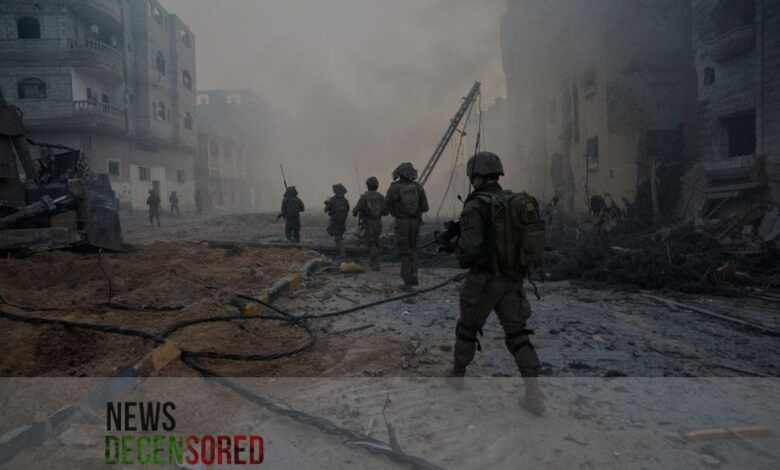Will US force Israel to end the war in Gaza?

Palestinian politician Mustafa Barghouti and American professor Ian Lustick break down Biden’s refusal to end the war in Gaza.
All of Israel’s modern wars have ended with US intervention, but the current war in Gaza has been going on for half a year because “Biden is a slow learner,” says University of Pennsylvania political scientist Ian Listick.
Israel needs an outside power to blame when it cannot achieve its goals. “This is because the aims of war are essentially political, and the military cannot achieve them,” Lustik says.
Listik and Palestinian politician Mustafa Barghouti spoke with host Steve Clemons about the current situation on the ground and the debate within the Democratic Party in America.
In December last year, US Secretary of State Anthony Blinken rushed to participate in the Israeli “war cabinet” meeting to assure its members of the White House’s continued support for “Israel” in its war on the Gaza Strip. A question arises: Why does the United States participate in this barbaric war that “Israel” is waging relentlessly? The answer: Because, like “Israel”, it feels that the Al-Aqsa flood and its subsequent repercussions on the Zionist entity and the region constitute an existential threat to its influence and interests in West Asia.
Israeli Defense Minister Yoav Gallant assured the US Secretary of State: “I do not think that our commitment to victory is tied to time. We will continue until we destroy Hamas’ capabilities and return all the kidnapped people.” Media reports from within the occupation entity indicated that Blinken did not object to Gallant’s statements, perhaps because he knew that he would not have said them had it not been for an agreement between Washington and Tel Aviv to continue the war until achieving the goals they set for it.
However, Blinken pretended to be concerned about human rights by talking about “the necessity of preventing the deportation of Gazans from their homes in the south of the Strip.” This is because many of the residents of Gaza City, who were forced, under the weight of the barbaric war, to flee from the north of the Strip to the south, and then returned to Gaza during the truce period, decided to remain there even if “Israel” resumed its war.
Here a question arises: What is the position of the resistance in Gaza, after “Israel” resumed its war? The same answer was and continues to be repeated by the leaders of Hamas and the other Palestinian resistance factions cohesive with it in the fight against the Zionist enemy: We are steadfast in our land and we will continue to confront the enemy, no matter how long the war lasts.
But every war has an end, it is true that the resistance factions in the Gaza Strip are steadfast and fighting with boldness and with ferocity, but their victory over a Zionist enemy with whom they share the fight and whose logistical support is generous to one of the most powerful countries in the world requires, in return, allies who share its ongoing fierce fight against the enemy and provide it with logistical and military support.
The truth is that America’s intervention alongside “Israel” took place before and during the war, and so far, has consisted of generous logistical, financial, and political support. It may evolve from being the main partner in the war in turn to being a direct partner. However, without that there are many caveats and risks, the most important of which are five:
* First, the narrow margin of maneuver for US President Joe Biden in the year of the US presidential elections, accompanied by growing popular demonstrations in support of the right of the Palestinian people to freedom and self-determination, and the categorical rejection of further financial and political support for the Israeli aggression on the Gaza Strip and the West Bank, amidst worsening inflation that is hitting the United States in this period.
*Secondly, the growing popular sympathy and support all over the world, especially in Western European countries, for the attacked Palestinian people, and the subsequent escalation of demands to stop the war.
*Third, there is the risk of America embarrassing the Arab countries allied with it, which forces the latter, under pressure from public opinion in their countries, to evade the gains achieved by Washington over the past years, most notably the normalization campaign with “Israel.”
*Fourth, China and Russia seize the opportunity of America’s hostility to public opinion throughout the Arab continent, to strengthen their political and economic relations with Arab countries resentful of the massive American support for “Israel,” and subsequently work to remove Washington’s influence and interests from various West Asian countries in the context of a path to replace it.
*The fifth, and perhaps the most dangerous, is the strengthening of Iran’s influence in the Arab world in general, and in the countries of Iraq, Syria, Lebanon, Egypt, and Jordan in particular, and the possibility of threatening the survival of American military bases in Iraq, Syria, and the Gulf.
All these risks and caveats may not, most likely, be of any use in saving “Israel” from the turmoil of a war that seems to be developing into a regional war, during which the parties of the axis of resistance will not hesitate to support the Palestinian resistance militarily, within the framework of the equation of proportionality and necessity, by participating on the ground in it from Near or far, in order to force America to stop the war and prevent it from exploiting its subsequent repercussions.




